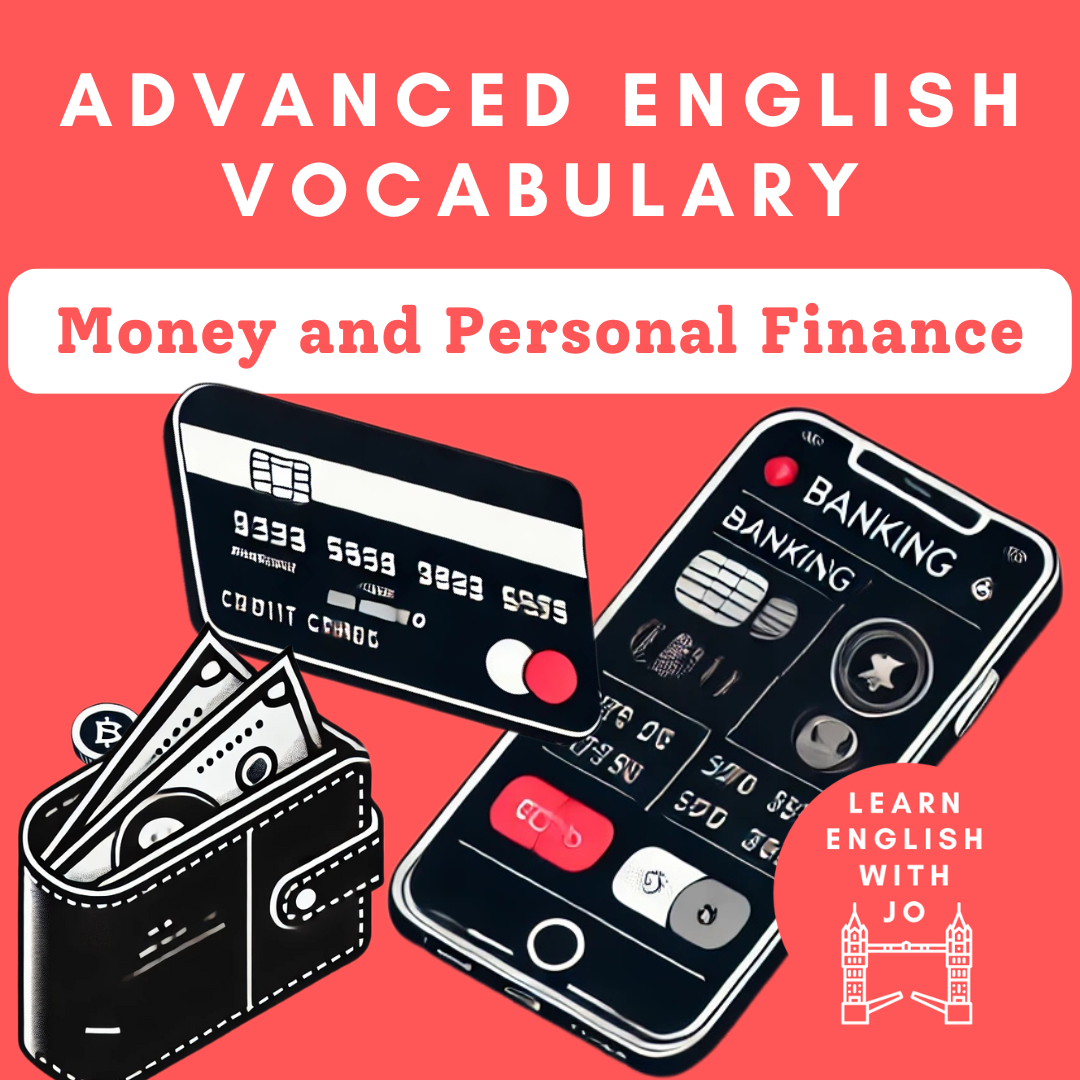Advanced English Vocabulary for Talking About Money and Personal Finances
Talking about money and personal finances in English requires a strong grasp of vocabulary to articulate your thoughts clearly and accurately. In this blog post, we’ll explore advanced English adjectives, verbs, nouns, and phrases to help you discuss financial topics with confidence.
Quick Tip
Before we get started, it’s worth considering that discussing personal finances can also be a rather delicate subject amongst the British. It is generally considered impolite to ask someone directly about their income, savings, or spending habits unless you have a close relationship. Instead, conversations about money often take a more general or hypothetical tone.
Being respectful, non-intrusive, and mindful of cultural norms is key when talking about personal finances.
Adjectives
Frugal – Spending money carefully and wisely.
Example: She’s very frugal and always looks for the best deals.
Affluent – Having a great deal of money; wealthy.
Example: The affluent neighbourhood is known for its luxurious homes.
Solvent – Having enough money to pay all debts.
Example: After years of hard work, the business is finally solvent.
Lucrative – Producing a large amount of money; profitable.
Example: Real estate can be a lucrative investment.
Impoverished – Extremely poor.
Example: The charity aims to support impoverished families.
Fiscally responsible – Managing money in a way that avoids unnecessary debt or risk.
Example: Governments must be fiscally responsible to ensure economic stability.
Overindulgent – Spending too much or indulging excessively.
Example: Overindulgent spending during the holidays often leads to financial strain.
Debt-ridden – Having a large amount of debt.
Example: Many students graduate debt-ridden due to student loans.
Verbs
Splurge – To spend money freely or extravagantly.
Example: He splurged on a new car after receiving a bonus.
Invest – To allocate money with the expectation of a return.
Example: She invests in stocks to grow her wealth.
Default – To fail to pay back a loan.
Example: If you default on your mortgage, you risk losing your home.
Accrue – To accumulate or receive (typically referring to money or benefits).
Example: Interest will accrue on the savings account over time.
Budget – To plan the use of money carefully.
Example: They budget carefully to save for their dream holiday.
Negotiate – To discuss terms in order to reach an agreement.
Example: You can often negotiate a lower interest rate with your bank.
Diversify – To spread investments across different areas to reduce risk.
Example: It’s important to diversify your portfolio to protect against market downturns.
Reconcile – To ensure two sets of financial records match.
Example: She reconciles her bank statements at the end of every month.
Nouns
Asset – Anything of value owned by an individual or organization.
Example: Property is one of their most valuable assets.
Liability – Something for which one is legally responsible, usually a debt.
Example: The company’s liabilities exceeded its assets.
Equity – The value of an asset minus liabilities, often used in real estate or business.
Example: They have built significant equity in their home over the years.
Mortgage – A loan specifically for purchasing property.
Example: Their monthly mortgage payment is quite high.
Interest – The cost of borrowing money, usually expressed as a percentage.
Example: The interest rate on this loan is very competitive.
Overdraft – A deficit in a bank account caused by withdrawing more than the available balance.
Example: He was charged a fee for his overdraft.
Dividend – A payment made by a company to its shareholders, typically from profits.
Example: The company issued a generous dividend this quarter.
Portfolio – A collection of investments owned by an individual or organization.
Example: His investment portfolio includes stocks, bonds, and real estate.
Inflation – The rate at which the general level of prices for goods and services rises.
Example: Inflation erodes the purchasing power of money.
Savings – Money set aside for future use.
Example: Building an emergency savings fund is essential.
Phrases
Make ends meet – To manage to cover basic expenses with the available income.
Example: With rising costs, it’s becoming harder to make ends meet.
Live beyond one’s means – To spend more money than one earns.
Example: Living beyond one’s means often leads to debt.
Rainy day fund – Money saved for emergencies.
Example: It’s always wise to have a rainy day fund.
Pay through the nose – To pay a very high price for something.
Example: They paid through the nose for last-minute flights.
A penny saved is a penny earned – Saving money is as valuable as earning it.
Example: She’s very careful with her spending because she believes a penny saved is a penny earned.
In the red – Owing more money than is available.
Example: After a tough year, the company was in the red.
In the black – Having more money than is owed; profitable.
Example: The business has been in the black for five consecutive years.
Tighten one’s belt – To spend less money due to financial constraints.
Example: With rising costs, many families are tightening their belts.
Throw money down the drain – To waste money.
Example: Buying that expensive gadget was like throwing money down the drain.
Nest egg – Savings set aside for the future, especially retirement.
Example: They’ve been building a nest egg for their retirement.
You might be interested in this post
To master these advanced financial terms, try incorporating them into your everyday conversations. Discuss your financial goals, create hypothetical scenarios, or even write about a financial situation using these words and phrases. The more you practice, the more confident you’ll become in discussing money and personal finances in English.


